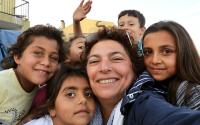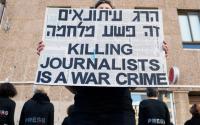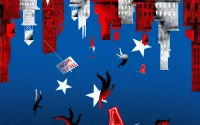Common Dreams / Published on Wednesday, January 18, 2006 by the Inter Press SeHumberto Márquez
Some 100,000 social activists from across the Americas and the world will soon be arriving in the Venezuelan capital, where they will condemn war and imperialism, and lend their support -- although not unconditionally -- to the changes introduced in this country by President Hugo Chávez.
 "The great people of the United States are our brothers, my salute to them," Chavez told the 15.000 World Social Forum participants that managed to get inside the Gigantinho Stadium in Porto Alegre to hear him speak.Credit: Agencia Bolivariana de Noticias "The great people of the United States are our brothers, my salute to them," Chavez told the 15.000 World Social Forum participants that managed to get inside the Gigantinho Stadium in Porto Alegre to hear him speak.Credit: Agencia Bolivariana de Noticias |
The sixth annual World Social Forum (WSF) is being held at several different sites this year, instead of one centralised forum as in the first five editions. In addition to the Americas forum in Caracas Jan. 24-29, the African forum will take place in Bamako, Mali, Jan. 19-23, and the Asian meet will be in the southern Pakistani city of Karachi in March. In Venezuela the WSF "will find a process of transformation that has incorporated some of the policies of mass movements in this continent and in other regions. People come to the forum to speak and debate, but also to see and learn," Carlos Torres, of the Canadian non-governmental organisation Alternatives, told IPS. The Venezuelan government is carrying out agrarian reform, redistributing government land and large private estates. It has launched mass literacy and adult education programmes, and set up basic health centres across the country -- many staffed by Cuban doctors. Outlets for subsidised food have also been put in place nationwide. As for foreign relations, Chávez speaks out strongly against the U.S. government and President George W. Bush, and is critical of the U.S.-led invasion of Iraq. He defends high crude oil prices and works to strengthen the Organisation of Petroleum Exporting Countries (OPEC). And, under Chávez's policies, Venezuela supplies fuel to Caribbean and Latin American countries on preferential terms, as a form of cooperation. "Of course the forum is neither apolitical nor antipolitical. It is political, it is a meeting of social organisations that have their own world view," Edgardo Lander of the Latin American Social Sciences Council, co-organiser of the WSF, told IPS. When Venezuela was proposed last year as the next venue, at the fifth WSF in the southern Brazilian city of Porto Alegre, there was some worry about the potential "Chávezation" of the event, because of the host president's outsized personality, but particularly his activism, as he seeks re-election in December. His confrontational attitude towards Washington, and his forging of Latin American alliances using Venezuelan oil were also listed as points of concern. "Although it does provide Chávez with an opportunity to show thousands of social activists from all over the world what he does, a lot of people who take part in the WSF have a left-wing view of society, and are interested in seeing as well as discussing," Francisco Iturraspe, of the Latin American Association of Labour Lawyers, said in an interview with IPS. The WSF Hemispheric Council met with Chávez one year ago, Lander said, "and we explained the nature of the forum to him, as self-managing and non-paternalist, which is not Bolivarian (as the president defines himself) or Chavist, and he acquiesced." The WSF Charter of Principles states that it is a non-governmental and non-party entity. Jacobo Torres, of the trade union Bolivarian Workers' Force, told IPS that, precisely because of these scruples, Chávez will participate outside of the official WSF programme. The president will attend a rally on the night of Jan. 25, to which Brazil's Landless Rural Workers' Movement (MST) and the international peasant movement Via Campesina are also invited. On the last day of the forum there will also be a meeting between Chávez and leaders of the World Assembly of Social Organisations, an initiative of the WSF as an alternative to the annual World Economic Forum, a meeting of the economic élite at the Swiss alpine resort of Davos. Lander remarked, however, that the WSF originally understood itself to be part of civil society, "something new, good, uncontaminated by traditional politics, which were perceived as being rather dirty. But the truth is that when the thematic axes of the 6th Forum were decided, most of the activities involved political debate." The first theme is "Power, politics and the fight for social emancipation," with debates about states, political parties and social movements, as well as practical resistance against domination and political violence. The second is "Imperial strategies and peoples' resistance," covering topics from imperialist military expansion to terrorism and free trade. In "Resources and rights for life: alternatives to the predatory model of civilisation," there will be discussions about capitalism, privatisation of resources, global warming, desertification and the right to health. The fourth axis is on "Diversity, identities and worldviews in motion," that is, peoples, indigenous nations and Afro-descendants, dialogue between religions, gender identities and sexual diversity. The fifth theme is "Work, exploitation and reproduction of life," about the increasing precariousness of employment, as well as exclusion, inequality and poverty. Finally, there is "Communication, culture and education: alternative and democratising dynamics," on the right to communication, social appropriation of technology, and artistic versus hegemonic production. In addition to Chávez, another president expected to make a showing at the Caracas WSF is Brazil's Luiz Inácio Lula da Silva. Brazil was the birthplace of the WSF, with Porto Alegre hosting the event four of the five first years, and Lula has called this social conclave an "ideological fair." Lander disagrees, because "although (the WSF) brings together organisations that think differently, there is continuity in its campaigns and it's a place where networks can be formed, such as those that oppose the Free Trade Area of the Americas, or are against the war in Iraq, or the policy of the World Trade Organisation, or against foreign debt." All these networks "have a privileged place at the forum, to evaluate the work done and analyse present circumstances, and to put their plans into effect. The WSF isn't only for exchanging experiences, meeting other people and celebrating life," stated Lander. Nearly 2,000 activities registered for the Americas WSF will take place in about 250 meeting rooms, tents and open spaces in the "forum territory," which is actually made up of four public spaces in Caracas. The central area of the city is home to three million people. Outside Caracas there will be a Youth Camp, and organisers are appealing to city residents to provide low-cost lodging in their homes, in the name of solidarity. They are hoping that the closure of the highway connecting the capital to its airport due to a bridge collapse will not discourage participants from abroad. "We expect that up to 30,000 foreign participants will come by air, and another 30,000 by land, from Brazil and Colombia," said Zuraima Martínez, another forum organiser. The largest delegations will be from Venezuela and Brazil, and from Colombia, which is "of interest to us because of the anti-imperialist nature of the forum," said Carlos Torres. What is the connection between Colombia and the anti-imperialist stance? "Because the Colombia Plan (against drug trafficking and insurgency) functions to a large extent as a cog in the empire's machinery," Lander explained, in reference to the heavy financial and military backing from the United States. "Some people see (Colombian) President Álvaro Uribe as the Latin American (Israeli prime minister, Ariel) Sharon, an executor or spokesman, like Mexican President Vicente Fox, of imperialist policy," he said. "Our idea is to show that in these conflicts of interest, direct relationships between the people of different countries are important. Compared with these relationships between people, the states themselves are often fiction," Lander insisted.
 "The great people of the United States are our brothers, my salute to them," Chavez told the 15.000 World Social Forum participants that managed to get inside the Gigantinho Stadium in Porto Alegre to hear him speak.Credit: Agencia Bolivariana de Noticias
"The great people of the United States are our brothers, my salute to them," Chavez told the 15.000 World Social Forum participants that managed to get inside the Gigantinho Stadium in Porto Alegre to hear him speak.Credit: Agencia Bolivariana de Noticias





